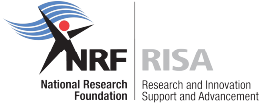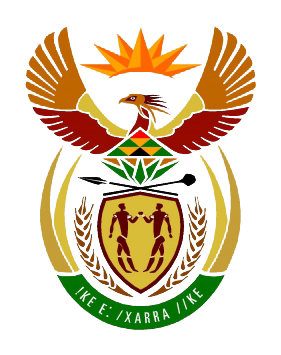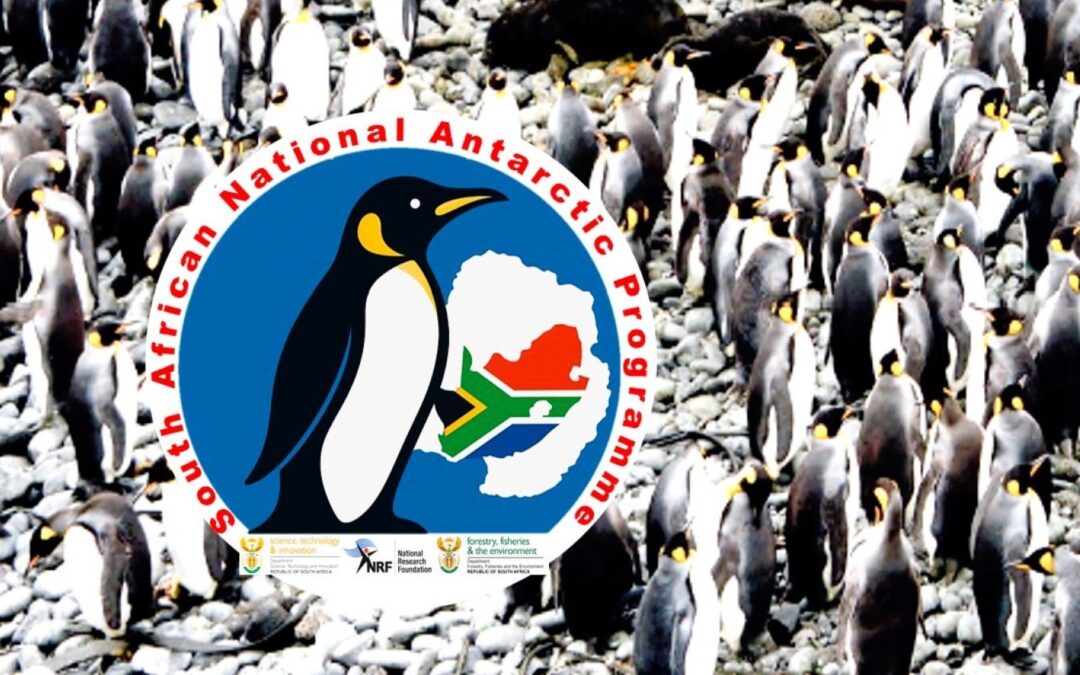
by Ria Olivier | Apr 25, 2025 | Antarctica, Gough Island, International Days, Marine Protected Area, Marion Island, Mice Eradication, Ornithology, Research, SANAP
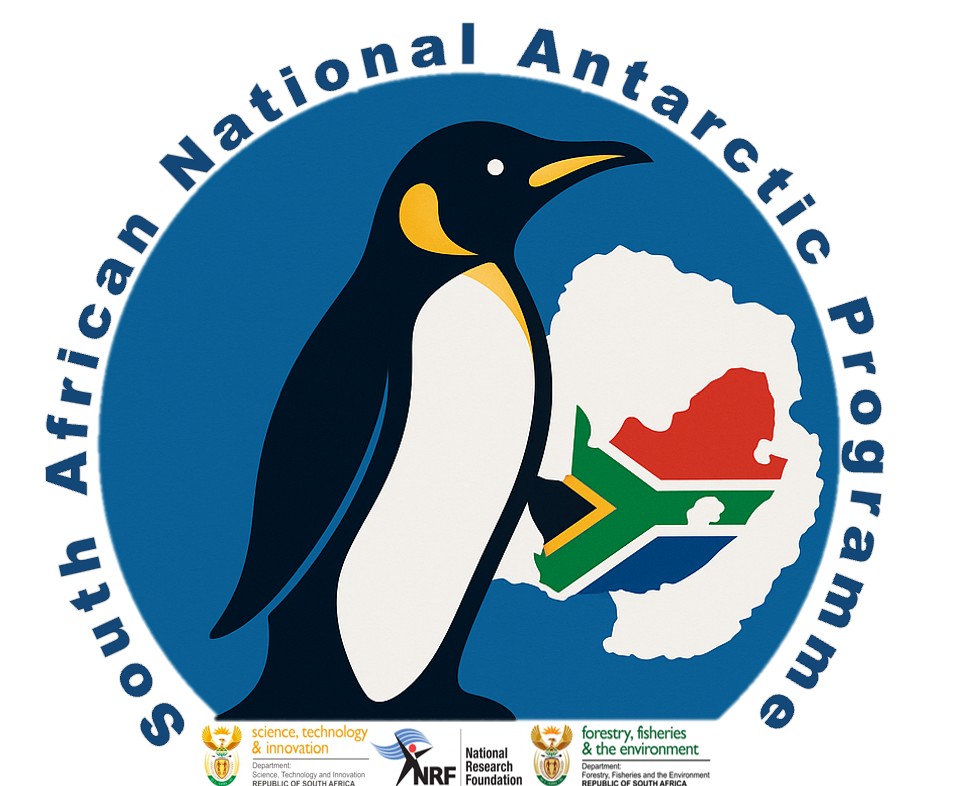 Every year on April 25th, we celebrate International Penguin Day—a global reminder of the unique role penguins plays in our planet’s ecosystems. These birds are not just symbols of the icy South—they are indicators of ocean health and climate change. From the sub-Antarctic islands to the Antarctic continent itself, penguins serve as sentinels of the sea, helping scientists track environmental shifts that affect us all.
Every year on April 25th, we celebrate International Penguin Day—a global reminder of the unique role penguins plays in our planet’s ecosystems. These birds are not just symbols of the icy South—they are indicators of ocean health and climate change. From the sub-Antarctic islands to the Antarctic continent itself, penguins serve as sentinels of the sea, helping scientists track environmental shifts that affect us all.
 South Africa plays a vital role in this mission through its National Antarctic Programme (SANAP), which supports long-term ecological research at key sites such as Gough Island, Marion Island, and Antarctica. These research stations are crucial hubs for studying penguin populations like the Northern Rockhopper on Gough Island and the Macaroni penguins on Marion Island. Scientists monitor breeding patterns, foraging behaviour, and survival rates—data that provide early warnings about oceanic changes. In Antarctica, SANAP researchers study Adélie and Emperor penguins, whose survival is intimately tied to the health of sea ice and krill populations.
South Africa plays a vital role in this mission through its National Antarctic Programme (SANAP), which supports long-term ecological research at key sites such as Gough Island, Marion Island, and Antarctica. These research stations are crucial hubs for studying penguin populations like the Northern Rockhopper on Gough Island and the Macaroni penguins on Marion Island. Scientists monitor breeding patterns, foraging behaviour, and survival rates—data that provide early warnings about oceanic changes. In Antarctica, SANAP researchers study Adélie and Emperor penguins, whose survival is intimately tied to the health of sea ice and krill populations.
 By investing in these research efforts, South Africa not only contributes to global conservation science but also highlights the importance of protecting our shared polar heritage. This International Penguin Day let’s celebrate the science that keeps these beloved birds waddling into the future.
By investing in these research efforts, South Africa not only contributes to global conservation science but also highlights the importance of protecting our shared polar heritage. This International Penguin Day let’s celebrate the science that keeps these beloved birds waddling into the future.
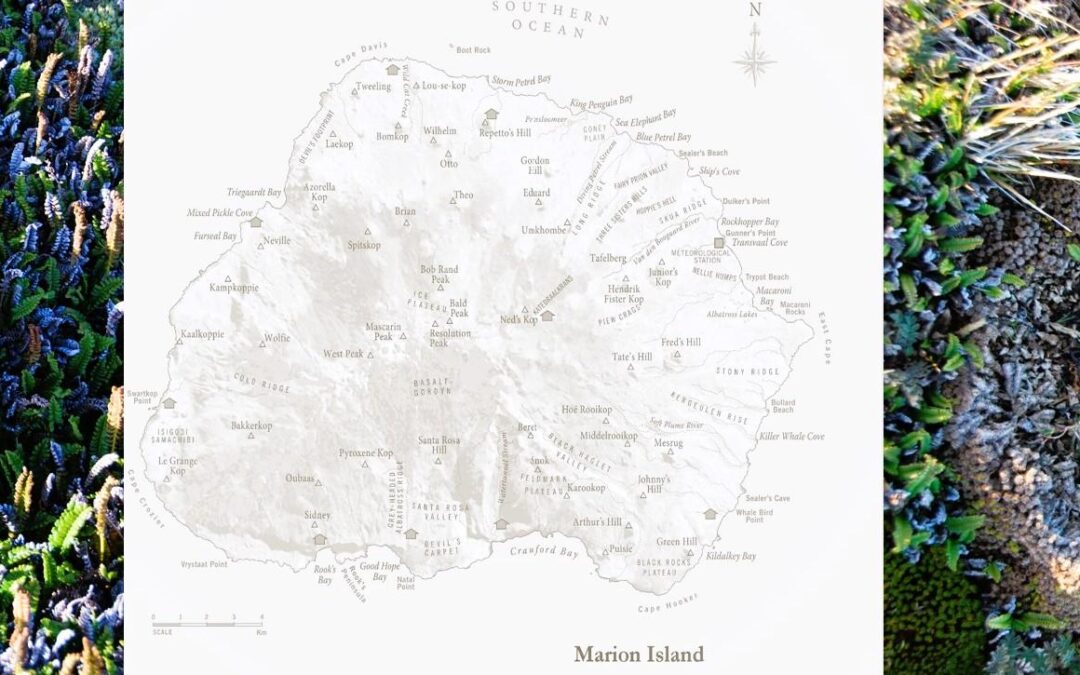
by Ria Olivier | Apr 24, 2024 | Biosecurity, Ecology, Marion Island, Mice Eradication, Take-Over Operations
The Marion Island mouSe Ecology (MISE) Project: Towards a comprehensive understanding of impacts of the invasive house mouse on the terrestrial biodiversity of Marion Island
 (Above: Azorella selago – left: intact, right: eaten by mice)
(Above: Azorella selago – left: intact, right: eaten by mice)
This SANAP-funded project will set out to model the terrestrial food web on Marion Island, with a specific focus of understanding the role of the the invasive house mouse (Mus musculus), on the biodiversity and ecosystem functioning of Marion Island. The house mouse is an apex terrestrial predator on the island, i.e. it has few to no natural predators, but probably has a major effect on organisms on the island from across the food chain. This exercise is of utmost importance because the house mouse has detrimental effects on a large percentage of species on the island, ranging from seabirds to plants and macroinvertebrates; yet, some of these impacts are not well understood. Also, mouse eradication is planned for Marion Island in 2025. Only if we know what the current impact of mice are on the Marion Island ecosystem, can we predict the efficacy of the eradication..
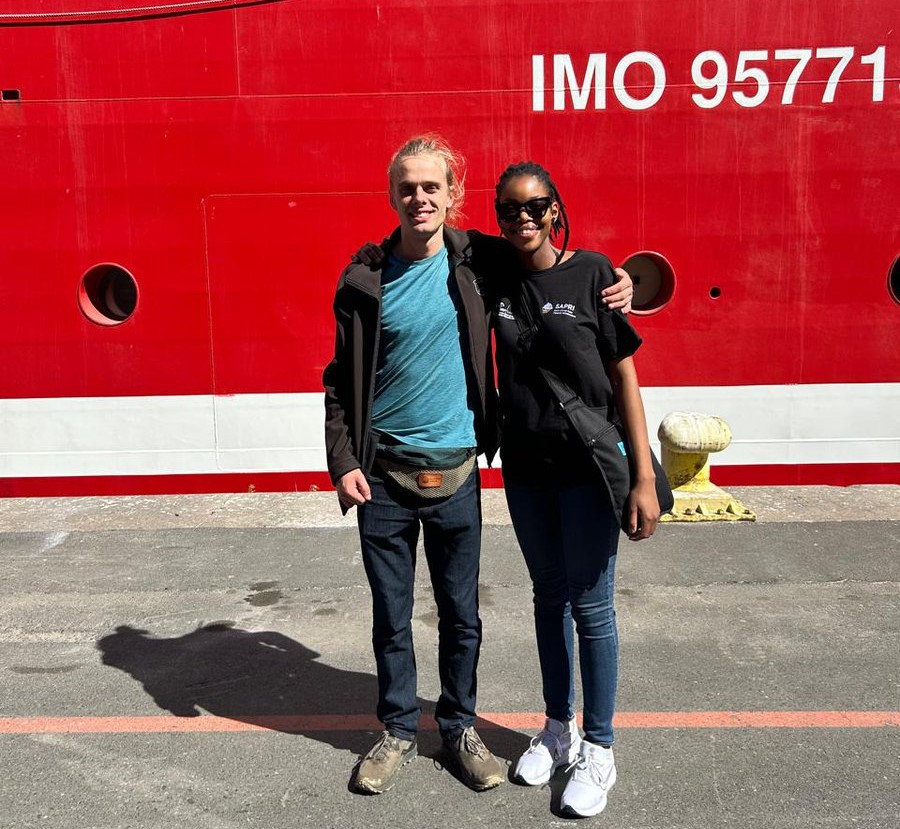
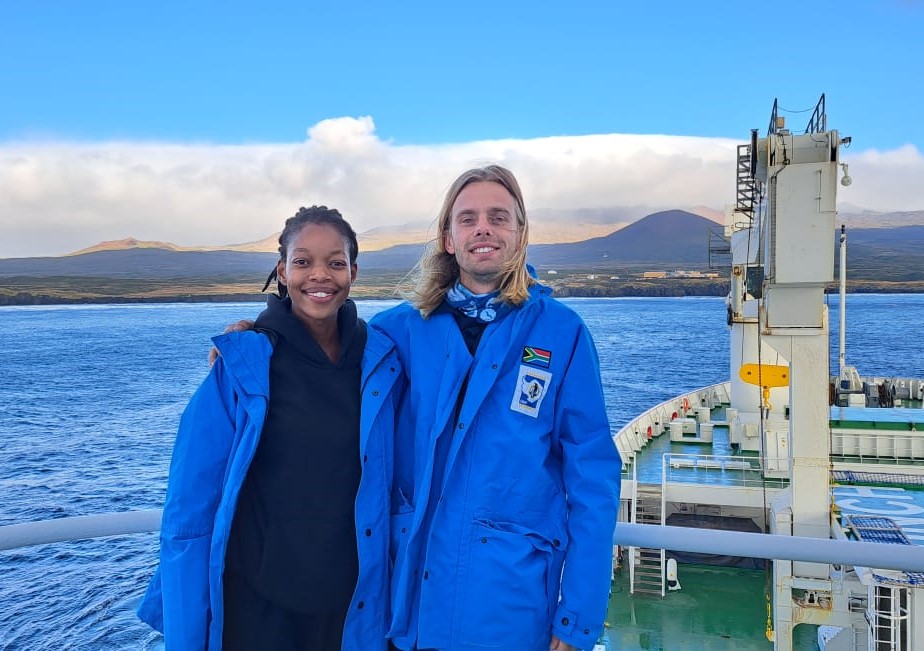 (Above: Elmar van Rooyen and Rabia Mathakutha. Left: before departure. Right: On board S.A.Agulhas II with Marion Island in the back)
(Above: Elmar van Rooyen and Rabia Mathakutha. Left: before departure. Right: On board S.A.Agulhas II with Marion Island in the back)
A major aim in the coming year will be to assess plant seed herbivory by mice, to see how this may have affected vegetation dynamics, and how mouse removal may affect vegetation dynamics; and also to understand current levels of invertebrate biomass on Marion Island. Invertebrates make up a major portion of the mouse diet, and repeat sampling since the 1970s has shown successive decreases in biomass. We will also be collecting data for isotope analyses to understand the food web on Marion Island in order to predict knock-on effects of mouse eradication and predict ecosystem recovery. Finally, we will be continuing long-term monitoring programmes of plants and invertebrates that were recently started, and also conduct some repeat sampling of protocols that were conducted some decades ago in order to assess how the system has changed in the last decades.
- Principal Investigator: Michelle Greve
- Affiliation: Department of Plant and Soil Sciences, University of Pretoria
- Research Programme: Towards a comprehensive understanding of impacts of the invasive house mouse on the terrestrial biodiversity of Marion Island
- Participants:
Marion 81 Overwintering Team: Elmar van Rooyen (University of Pretoria – UP)
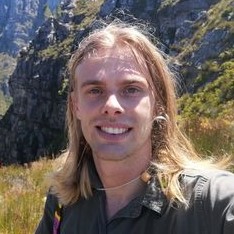 Allow me to introduce myself briefly. I am a 29-year-old conservation ecologist with a profound passion for nature and exploration. I hold an M.Sc. degree in Conservation Ecology & Entomology and possess a diverse skill set that includes expertise in ecology, restoration ecology, horticulture, botany, entomology, education, and management. Throughout my career, my focus has predominantly been on Southern Afrotemperate forests, and I have accumulated significant experience in South African forest ecology. I am drawn to this expedition for several reasons. Foremost, the opportunity to explore the unique environment of Marion Island presents a once-in-a-lifetime chance for me to expand my knowledge and understanding of sub-Antarctic ecosystems. While I may not have prior experience with the island, I firmly believe that firsthand experience is the most effective way to comprehend its ecology and wildlife. Moreover, I am deeply committed to the conservation of natural habitats, and Marion Island’s status as a biodiversity hotspot underscores the urgency of our research efforts. The presence of invasive house mice poses a significant threat to the island’s flora and fauna, necessitating thorough investigation and potential eradication strategies. Additionally, I am eager to contribute to studies on the impact of alien plant species and assist in devising methods for their control. I have always had a profound appreciation for fieldwork, and I relish the opportunity to immerse myself in hands-on research once again. Marion Island’s rugged terrain and unique challenges excite me, and I am prepared to tackle them head-on in the pursuit of conservation objectives.
Allow me to introduce myself briefly. I am a 29-year-old conservation ecologist with a profound passion for nature and exploration. I hold an M.Sc. degree in Conservation Ecology & Entomology and possess a diverse skill set that includes expertise in ecology, restoration ecology, horticulture, botany, entomology, education, and management. Throughout my career, my focus has predominantly been on Southern Afrotemperate forests, and I have accumulated significant experience in South African forest ecology. I am drawn to this expedition for several reasons. Foremost, the opportunity to explore the unique environment of Marion Island presents a once-in-a-lifetime chance for me to expand my knowledge and understanding of sub-Antarctic ecosystems. While I may not have prior experience with the island, I firmly believe that firsthand experience is the most effective way to comprehend its ecology and wildlife. Moreover, I am deeply committed to the conservation of natural habitats, and Marion Island’s status as a biodiversity hotspot underscores the urgency of our research efforts. The presence of invasive house mice poses a significant threat to the island’s flora and fauna, necessitating thorough investigation and potential eradication strategies. Additionally, I am eager to contribute to studies on the impact of alien plant species and assist in devising methods for their control. I have always had a profound appreciation for fieldwork, and I relish the opportunity to immerse myself in hands-on research once again. Marion Island’s rugged terrain and unique challenges excite me, and I am prepared to tackle them head-on in the pursuit of conservation objectives.
Marion Takeover 2024: Rabia Mathakutha (South African Polar Research Infrastructure -SAPRI)
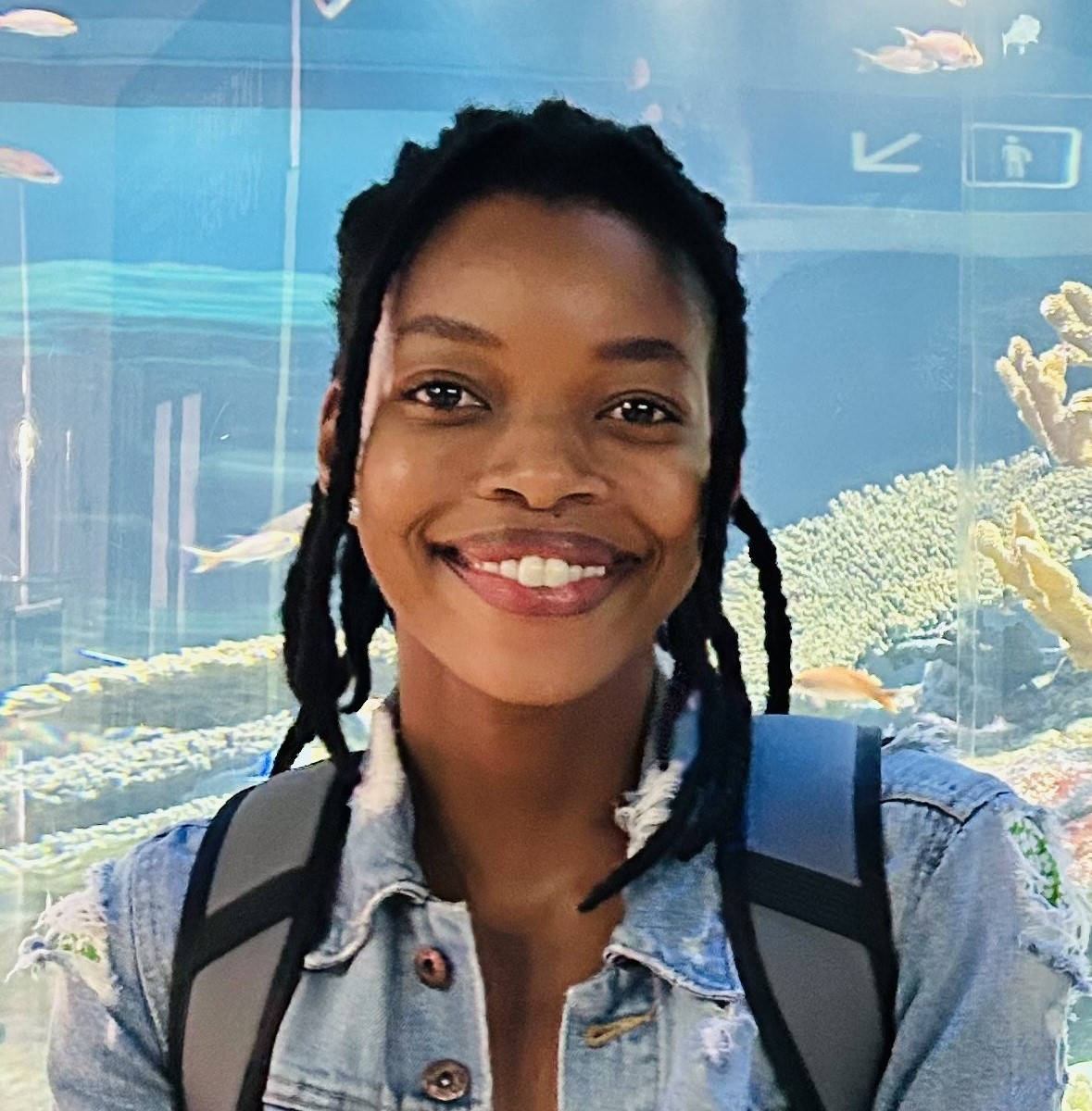 Rabia is excited to participate in the 2024 Marion Island Relief Expedition. Rabia is an ecologist by training and will be working as part of the University of Pretoria research team towards a comprehensive understanding of impacts of the invasive house mouse on the terrestrial biodiversity of Marion Island. Rabia first visited the island as part of her Masters research project during the 2015 and 2016 relief expeditions. Rabia’s MSc in Plant Science was focused on understanding plant invasion potential and environmental change responses in the sub-Antarctic region, using Marion Island as a case study. This is when her passion for understanding and participating in the conservation of South Africa’s polar environment was ignited. In her current capacity, Rabia is a research coordinator for the Data, Products and Society (DPS) Integrated Facility of the South African Polar Research Infrastructure (SAPRI). She continues to support the polar research environment by ensuring coordinated access to research infrastructure and societal benefits through science engagement and science communication. Rabia views this chance to revisit the island as a once-in-a-lifetime opportunity, one that will not only build upon previous efforts in understanding plant dynamics but also advance our understanding of ecological processes in response to a threatening invader. There’s no better place to study this than Marion Island, our own natural laboratory, and where it’s most urgently needed. As part of the larger Mouse-Free Marion project, Rabia considers this as a significant contribution to global conservation efforts, and in her words, “saving the world!”.
Rabia is excited to participate in the 2024 Marion Island Relief Expedition. Rabia is an ecologist by training and will be working as part of the University of Pretoria research team towards a comprehensive understanding of impacts of the invasive house mouse on the terrestrial biodiversity of Marion Island. Rabia first visited the island as part of her Masters research project during the 2015 and 2016 relief expeditions. Rabia’s MSc in Plant Science was focused on understanding plant invasion potential and environmental change responses in the sub-Antarctic region, using Marion Island as a case study. This is when her passion for understanding and participating in the conservation of South Africa’s polar environment was ignited. In her current capacity, Rabia is a research coordinator for the Data, Products and Society (DPS) Integrated Facility of the South African Polar Research Infrastructure (SAPRI). She continues to support the polar research environment by ensuring coordinated access to research infrastructure and societal benefits through science engagement and science communication. Rabia views this chance to revisit the island as a once-in-a-lifetime opportunity, one that will not only build upon previous efforts in understanding plant dynamics but also advance our understanding of ecological processes in response to a threatening invader. There’s no better place to study this than Marion Island, our own natural laboratory, and where it’s most urgently needed. As part of the larger Mouse-Free Marion project, Rabia considers this as a significant contribution to global conservation efforts, and in her words, “saving the world!”.
Text and images by MISE.
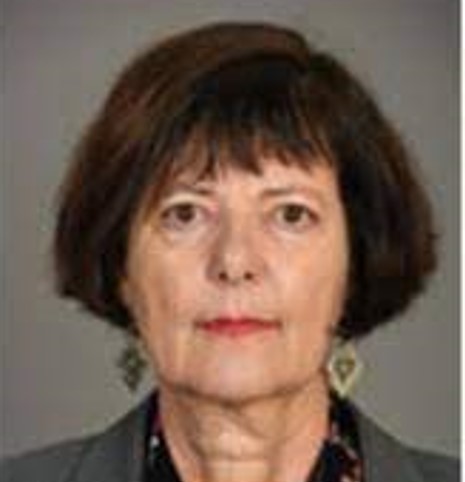
by Ria Olivier | Mar 11, 2024 | Announcement, Environment, Invasion Biology, Marine Protected Area, Marion Island, Mice Eradication, Prince Edward Island, Prince Edward Islands
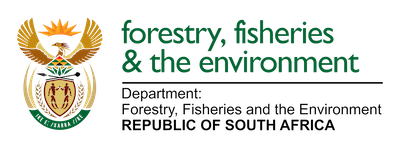 MINISTER CREECY LAUNCHES THE 3RD NATIONAL STATUS OF BIOLOGICAL INVASIONS AND THEIR MANAGEMENT IN SOUTH AFRICA
MINISTER CREECY LAUNCHES THE 3RD NATIONAL STATUS OF BIOLOGICAL INVASIONS AND THEIR MANAGEMENT IN SOUTH AFRICA
Full release available on Department of Forestry Fisheries nd the Environment website
 “We must continue investing in research and innovation, supporting studies that enhance our understanding of invasive species dynamics to improve management strategies. The 3rd National Status report on Biological Invasions serves as a clarion call for action reminding us of the urgency of the situation and the imperative to act decisively,”
“We must continue investing in research and innovation, supporting studies that enhance our understanding of invasive species dynamics to improve management strategies. The 3rd National Status report on Biological Invasions serves as a clarion call for action reminding us of the urgency of the situation and the imperative to act decisively,”
“Addressing the challenges posed by biological invasions requires a coordinated and collaborative effort. No single entity can tackle this issue alone. Government, academics, civil society organisations and communities must come together, pooling their knowledge, resources and expertise to develop effective prevention, early detection and control strategies,” said Minister Creecy.
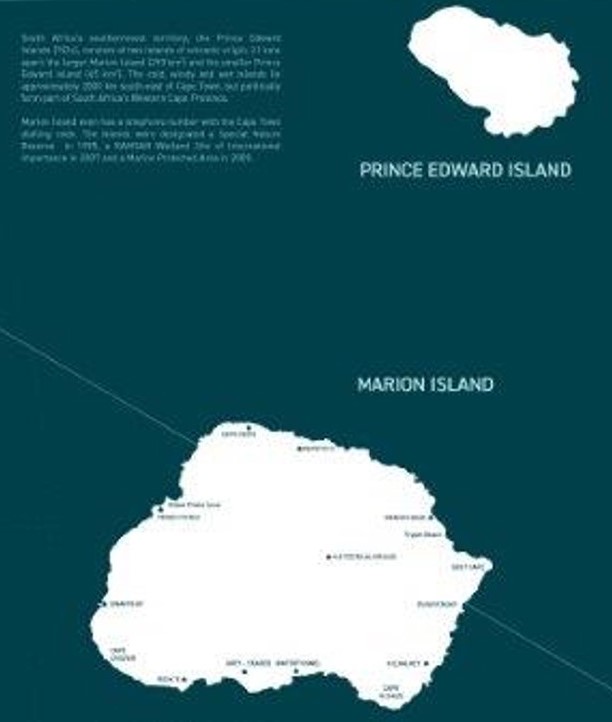 Thirdly, invasive species are devastating the unique and sensitive biodiversity of the Prince Edward Islands. For the first time, this report provides a separate assessment of the status of biological invasions and their management on the Prince Edward Islands. Although these islands are part of South Africa, their remote location and unique biodiversity warrant a separate assessment. Findings highlight the devastating impact of the house mouse, which is alien to the Marion Island. The mice feed on plants, and small animals including endangered seabirds. A bold plan to eradicate mice from the island has been developed and is due to be implemented in 2027. The eradication of mice from Marion Island is essential if its unique biodiversity is to be preserved.
Thirdly, invasive species are devastating the unique and sensitive biodiversity of the Prince Edward Islands. For the first time, this report provides a separate assessment of the status of biological invasions and their management on the Prince Edward Islands. Although these islands are part of South Africa, their remote location and unique biodiversity warrant a separate assessment. Findings highlight the devastating impact of the house mouse, which is alien to the Marion Island. The mice feed on plants, and small animals including endangered seabirds. A bold plan to eradicate mice from the island has been developed and is due to be implemented in 2027. The eradication of mice from Marion Island is essential if its unique biodiversity is to be preserved.

by Ria Olivier | Feb 28, 2024 | Biosecurity, Environment, Invasion Biology, Mice Eradication, Research, SANAP, SANAP Student
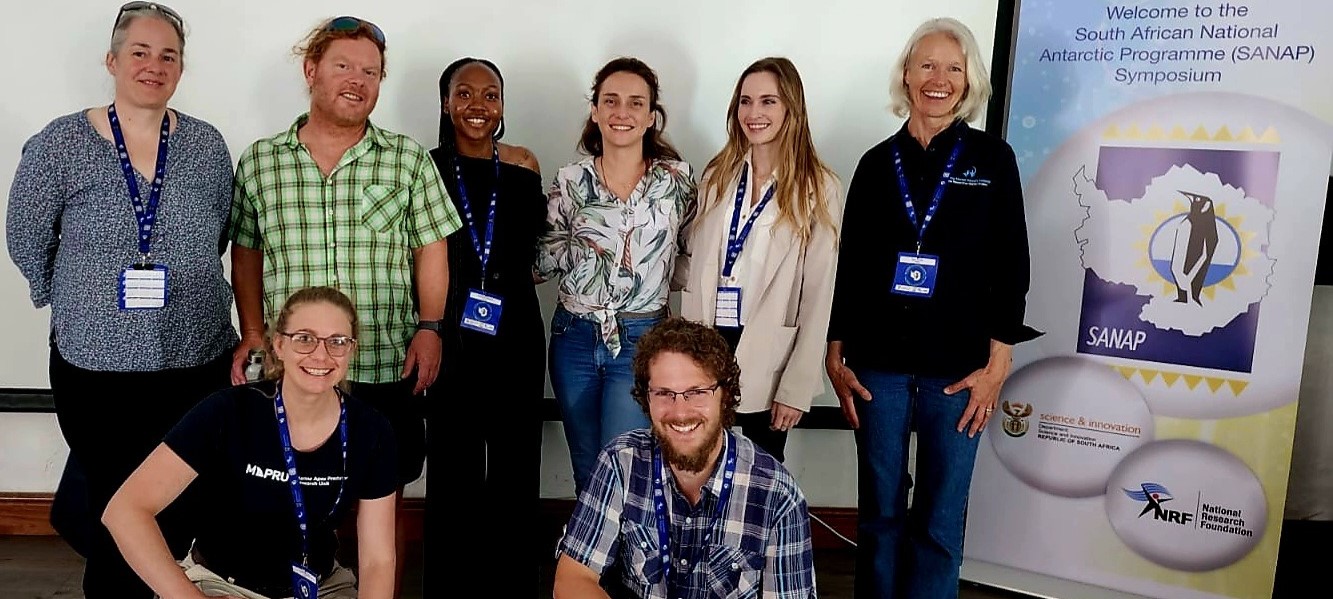
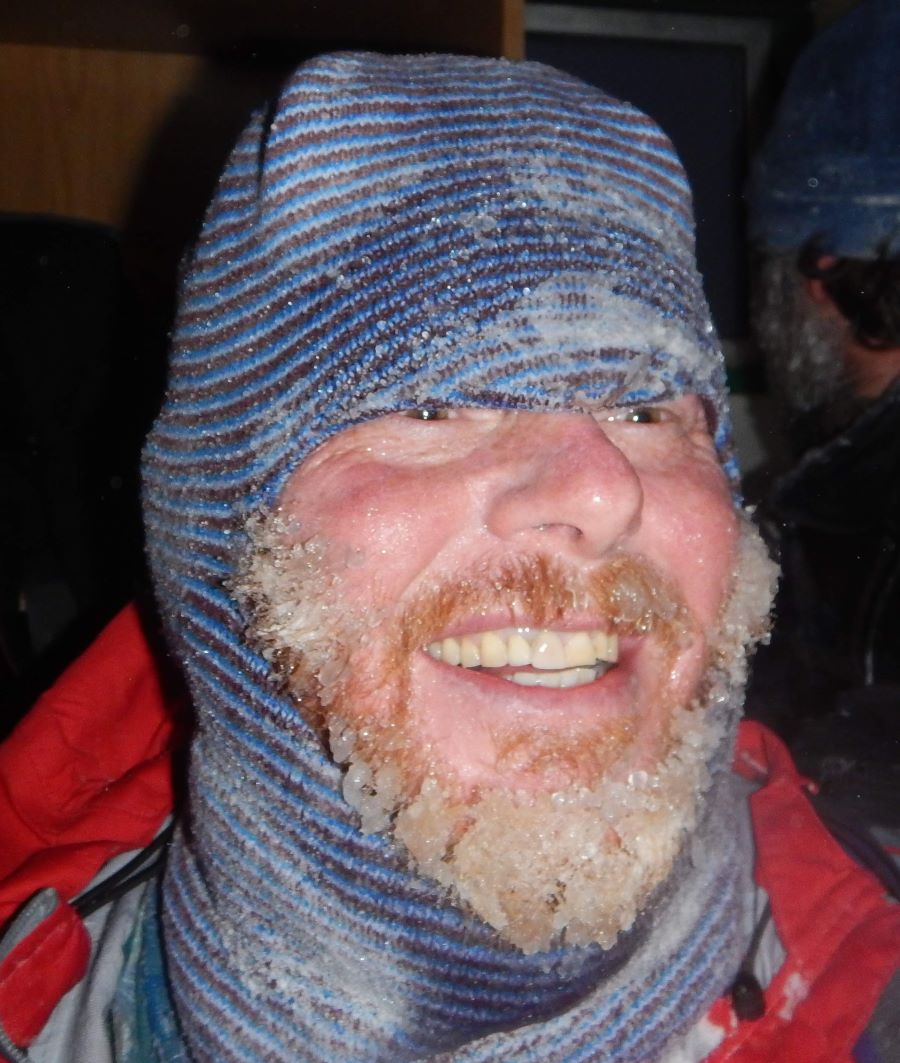
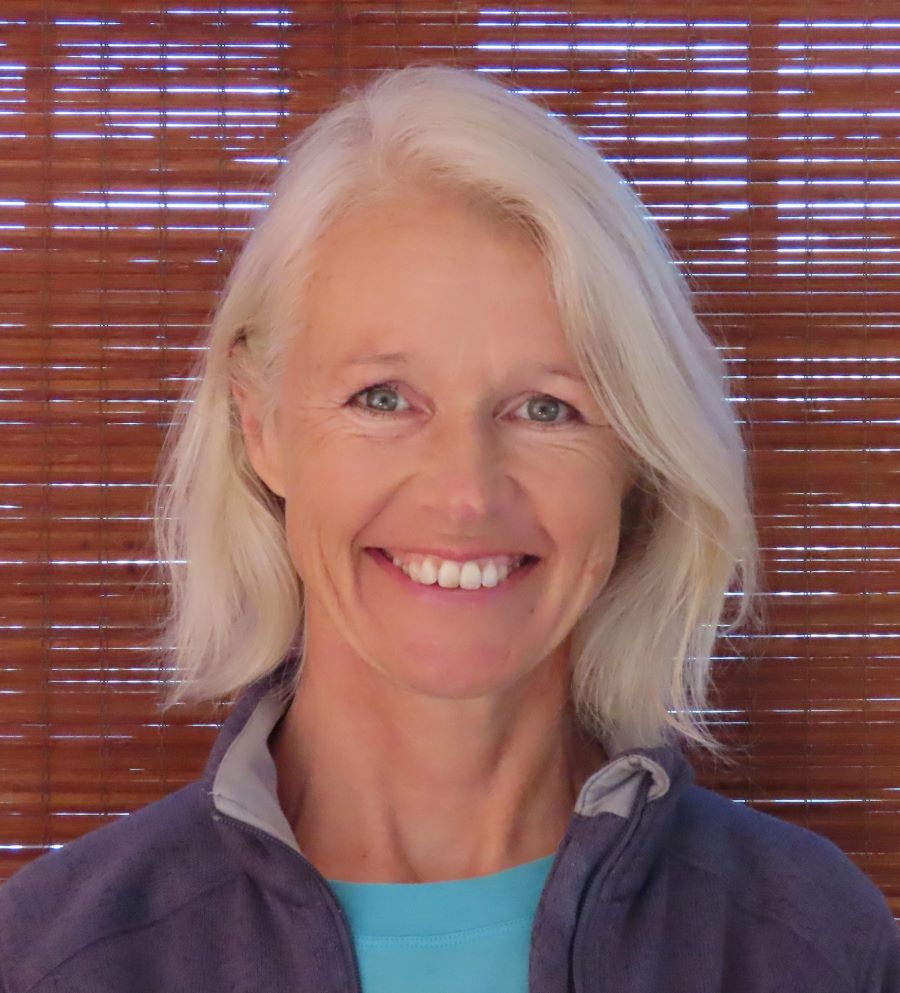 The last session within the Marine and Antarctic Research Strategy research theme : : Ecosystems, biodiversity and biodiscovery was chaired by Pierre Pistorius of the Marine Apex Predator Research Unit (MAPRU) at Nelson Mandela University. To kick off the session, the Mouse-Free Marion (MFM) Project’s Assistant Project Manager, Sue Tonin, gave a plenary lecture. This was followed by more presentations on ornithology research. (Above: group photo of MAPRU with Sue Tonin. Left: Pierre Pistorius. Right: Sue Tonin)
The last session within the Marine and Antarctic Research Strategy research theme : : Ecosystems, biodiversity and biodiscovery was chaired by Pierre Pistorius of the Marine Apex Predator Research Unit (MAPRU) at Nelson Mandela University. To kick off the session, the Mouse-Free Marion (MFM) Project’s Assistant Project Manager, Sue Tonin, gave a plenary lecture. This was followed by more presentations on ornithology research. (Above: group photo of MAPRU with Sue Tonin. Left: Pierre Pistorius. Right: Sue Tonin)
 Above (l-r): Vonica Perold, Tegan Walker, Shamiso Banda, Danielle Keys, Eleanor Weideman
Above (l-r): Vonica Perold, Tegan Walker, Shamiso Banda, Danielle Keys, Eleanor Weideman
- Dr Sue Tonin Eradicating Invasive House Mice Mus musculus from Marion Island: Gains and Challenges (Abstract)
- Vonica Perold South Atlantic seabirds can be used as bioindicators to monitor small buoyant plastics at sea. (Abstract)
- Tegan Walker Influence of diet and environmental parameters on Brown Skua breeding success at Marion Island
- Shamiso Banda Gauging the threat: exposure and attraction of Sooty Albatrosses and White-Chinned Petrels to fisheries activities in the southern Indian Ocean
- Danielle Keys Foraging behaviour of adult Wandering Albatrosses (diomedea exulans) in relation to growth and success of their offspring.
- Pierre Pistorius Tracking Southern Ocean predators to identify ecologically important habitat
- Eleanor Weideman Seasonal attendance patterns and habitat use of three avian scavengers at sub-Antarctic Marion Island. (Poster)
 Above (l-r):Maelle Connan, Stefan Schoombie, Robyn Adams, John Cooper
Above (l-r):Maelle Connan, Stefan Schoombie, Robyn Adams, John Cooper
Maelle Connan and Stefan Schoombie were part of the Prince Edward Island Scientific Expedition and were able to join the session. Stefan’s presentation was given in the Summer Survey session later on in the day. Support for Sue’s plenary came from Robyn Adams, MFM Communications Officer and Project Assistant, and John Cooper, MFM News Correspondent.
 To make your sponsorship to Mouse-Free Marion go to https://mousefreemarion.org/product/hectare/ and become a part of Marion Island’s future.
To make your sponsorship to Mouse-Free Marion go to https://mousefreemarion.org/product/hectare/ and become a part of Marion Island’s future.
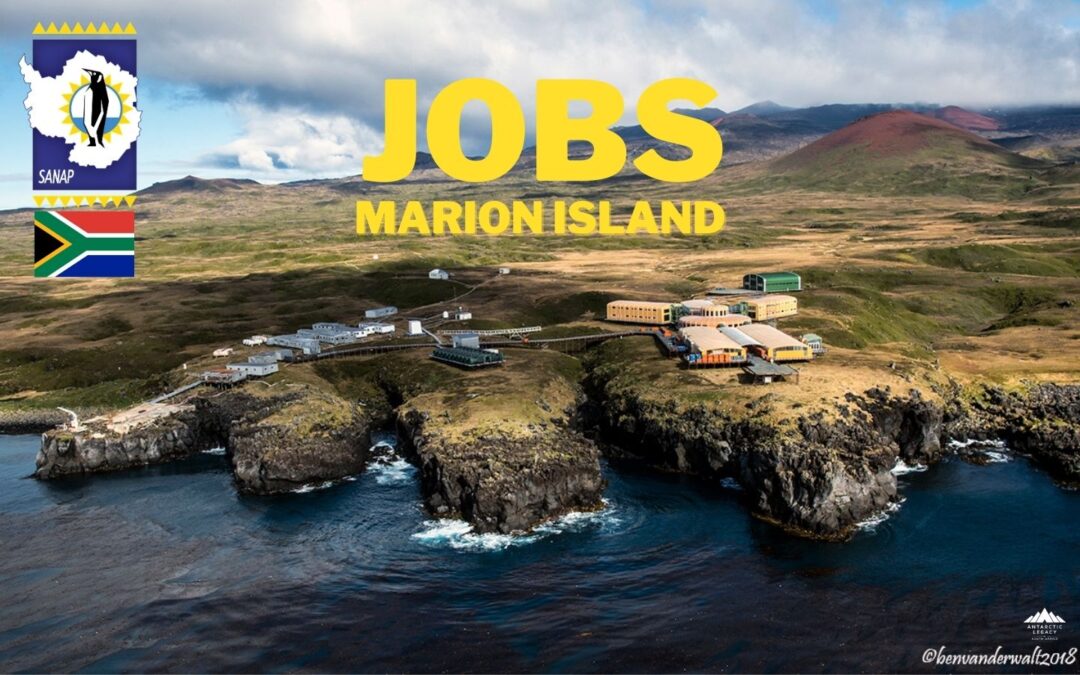
by Ria Olivier | Jan 29, 2024 | Ecology, Invasion Biology, Jobs, Marion Island, Mice Eradication, Overwintering Team, SANAP, sub-Antarctic, Team member
Vacancy for Mouse-Free Marion (MFM) Project Research Assistant on Marion Island (March 2024 – May 2025)
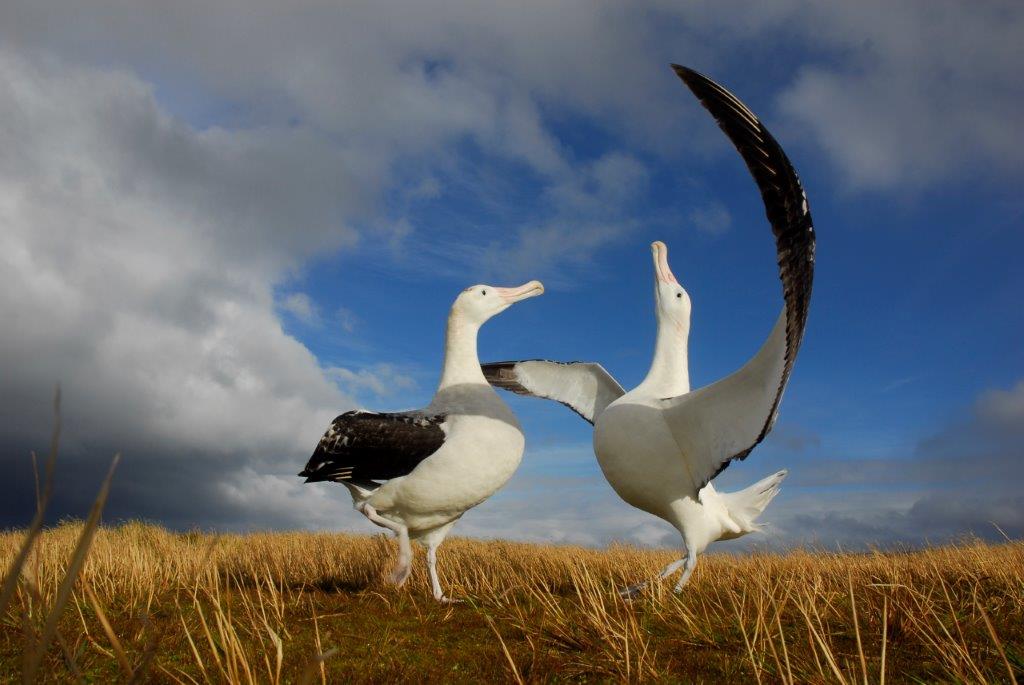
BirdLife South Africa, via the Mouse-Free Marion (MFM) Non-Profit Company (NPC), is offering an opportunity to a suitably qualified candidate to spend a year on Marion Island to continue monitoring studies designed to support the ongoing planning for the mouse-eradication operation. The position will include collecting field data on mice, continuing the monitoring of weather parameters, undertaking further field trials relating to the bait and, in collaboration with the University of Pretoria, contributing to the collection of baseline data on invertebrates and plants.
To read more about the Mouse Free Marion project – Click here
CLOSING DATE 12 FEBRUARY 2024
Read more about Marion Island and Overwintering Teams on the SANAP website
Key Responsibilities on Marion Island and Basic Academic Requirements, Experience, and Skills are is listed in the advertisement.
At least a B.Sc. (Hons) degree in conservation biology, ecology, or a related field.
Experience of field work in rugged terrain is required.
Please e-mail your application to Dr Isabel Human, at isabel.human@birdlife.org.za see relevant documents to be included in advertisement
South African applicants will receive priority. Please note that appointments will be contingent on availability of ship berths and funding.
For queries contact Dr. Sue Tonin, the Mouse-Free Marion Assistant Project Manager, at sue.tonin@birdlife.org.za
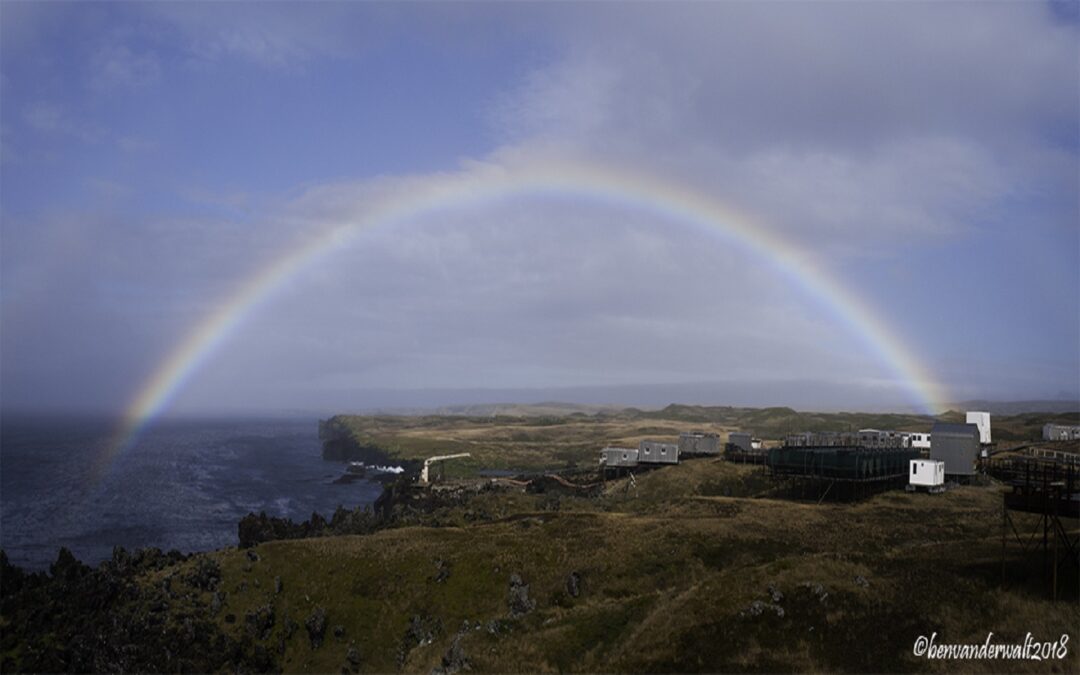
by Ria Olivier | Jan 25, 2024 | Ecology, Invasion Biology, Jobs, Marion Island, Mice Eradication, Overwintering Team, SANAP, sub-Antarctic, Team member
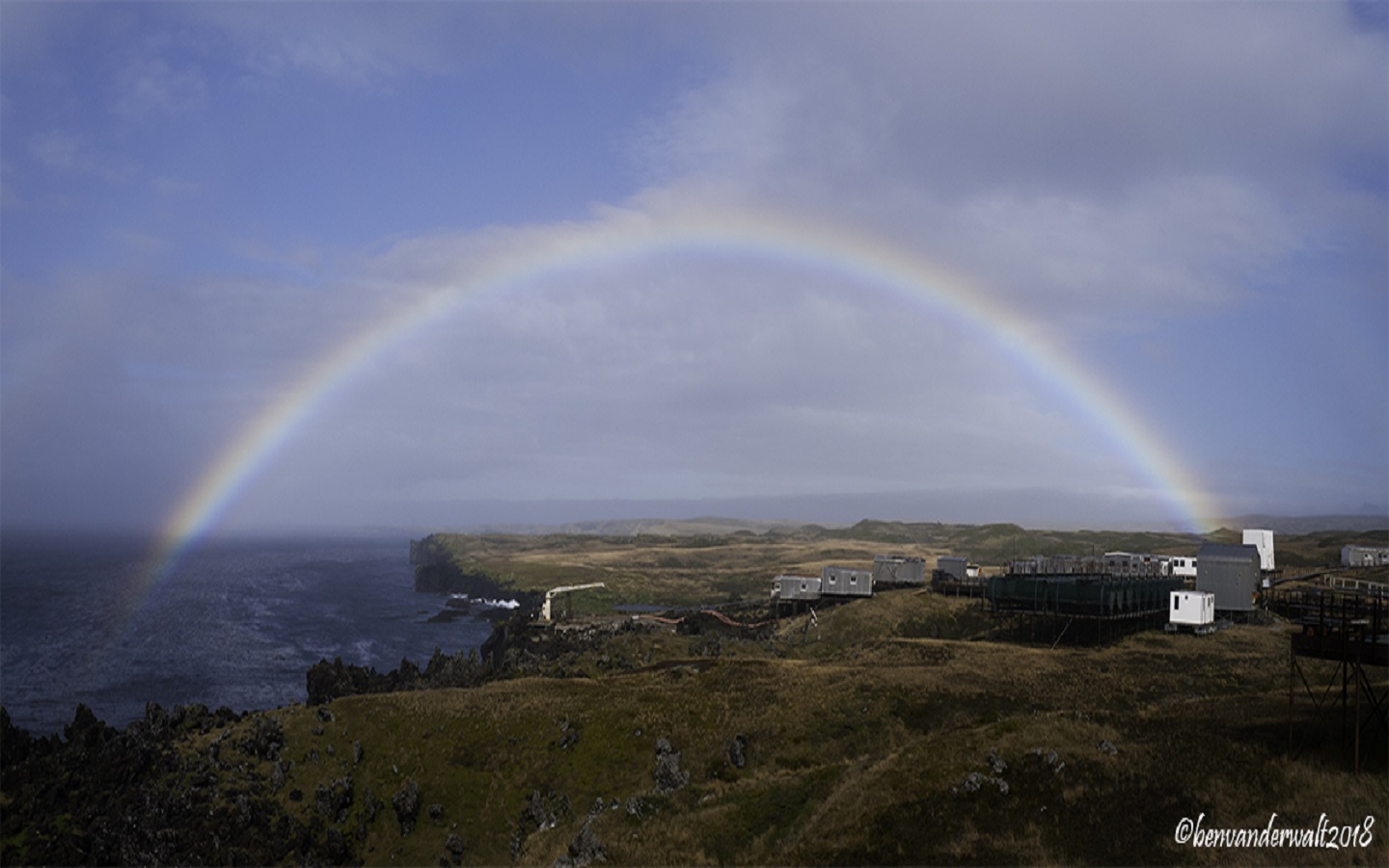 Vacancy for field researcher on Marion Island (March 2024 – May 2025) –
Vacancy for field researcher on Marion Island (March 2024 – May 2025) –
Mouse impacts on invertebrates and plants
 The Department of Plant and Soil Sciences at the University of Pretoria is offering one suitably qualified candidate an opportunity to spend a year on Marion Island to measure various aspects of the impact of the house mouse on the diversity and function of the terrestrial ecosystems of Marion Island. This work will entail collecting baseline data, mostly on invertebrates and plants.
The Department of Plant and Soil Sciences at the University of Pretoria is offering one suitably qualified candidate an opportunity to spend a year on Marion Island to measure various aspects of the impact of the house mouse on the diversity and function of the terrestrial ecosystems of Marion Island. This work will entail collecting baseline data, mostly on invertebrates and plants.
CLOSING DATE 4 FEBRUARY 2024
Read more about Marion Island and Overwintering Teams on the SANAP website
REQUIREMENTS (full list available in advertisement
Minimum BSc (Hons) degree in an ecological field.
Experience of field work in rugged terrain is required.
Excellent organisational skills, attention to detail, meticulous observation, note-taking
and record-keeping abilities.
Experience of invertebrate and/or plant surveys.
Computer literacy with experience in data management, statistical analysis (at least
one undergraduate statistics course) and report writing are required.
Applicants should submit their applications here.
South African applicants will receive priority. Please note that appointments will be contingent on availability of ship berths and funding.
For queries contact Prof Greve (michelle.greve@up.ac.za) via email.

 Every year on April 25th, we celebrate International Penguin Day—a global reminder of the unique role penguins plays in our planet’s ecosystems. These birds are not just symbols of the icy South—they are indicators of ocean health and climate change. From the sub-Antarctic islands to the Antarctic continent itself, penguins serve as sentinels of the sea, helping scientists track environmental shifts that affect us all.
Every year on April 25th, we celebrate International Penguin Day—a global reminder of the unique role penguins plays in our planet’s ecosystems. These birds are not just symbols of the icy South—they are indicators of ocean health and climate change. From the sub-Antarctic islands to the Antarctic continent itself, penguins serve as sentinels of the sea, helping scientists track environmental shifts that affect us all. South Africa plays a vital role in this mission through its National Antarctic Programme (SANAP), which supports long-term ecological research at key sites such as Gough Island, Marion Island, and Antarctica. These research stations are crucial hubs for studying penguin populations like the Northern Rockhopper on Gough Island and the Macaroni penguins on Marion Island. Scientists monitor breeding patterns, foraging behaviour, and survival rates—data that provide early warnings about oceanic changes. In Antarctica, SANAP researchers study Adélie and Emperor penguins, whose survival is intimately tied to the health of sea ice and krill populations.
South Africa plays a vital role in this mission through its National Antarctic Programme (SANAP), which supports long-term ecological research at key sites such as Gough Island, Marion Island, and Antarctica. These research stations are crucial hubs for studying penguin populations like the Northern Rockhopper on Gough Island and the Macaroni penguins on Marion Island. Scientists monitor breeding patterns, foraging behaviour, and survival rates—data that provide early warnings about oceanic changes. In Antarctica, SANAP researchers study Adélie and Emperor penguins, whose survival is intimately tied to the health of sea ice and krill populations. By investing in these research efforts, South Africa not only contributes to global conservation science but also highlights the importance of protecting our shared polar heritage. This International Penguin Day let’s celebrate the science that keeps these beloved birds waddling into the future.
By investing in these research efforts, South Africa not only contributes to global conservation science but also highlights the importance of protecting our shared polar heritage. This International Penguin Day let’s celebrate the science that keeps these beloved birds waddling into the future.
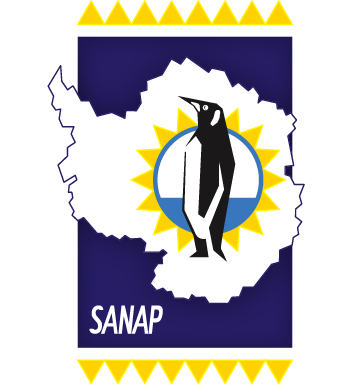

 (Above: Azorella selago – left: intact, right: eaten by mice)
(Above: Azorella selago – left: intact, right: eaten by mice)
 (Above: Elmar van Rooyen and Rabia Mathakutha. Left: before departure. Right: On board S.A.Agulhas II with Marion Island in the back)
(Above: Elmar van Rooyen and Rabia Mathakutha. Left: before departure. Right: On board S.A.Agulhas II with Marion Island in the back) Allow me to introduce myself briefly. I am a 29-year-old conservation ecologist with a profound passion for nature and exploration. I hold an M.Sc. degree in Conservation Ecology & Entomology and possess a diverse skill set that includes expertise in ecology, restoration ecology, horticulture, botany, entomology, education, and management. Throughout my career, my focus has predominantly been on Southern Afrotemperate forests, and I have accumulated significant experience in South African forest ecology. I am drawn to this expedition for several reasons. Foremost, the opportunity to explore the unique environment of Marion Island presents a once-in-a-lifetime chance for me to expand my knowledge and understanding of sub-Antarctic ecosystems. While I may not have prior experience with the island, I firmly believe that firsthand experience is the most effective way to comprehend its ecology and wildlife. Moreover, I am deeply committed to the conservation of natural habitats, and Marion Island’s status as a biodiversity hotspot underscores the urgency of our research efforts. The presence of invasive house mice poses a significant threat to the island’s flora and fauna, necessitating thorough investigation and potential eradication strategies. Additionally, I am eager to contribute to studies on the impact of alien plant species and assist in devising methods for their control. I have always had a profound appreciation for fieldwork, and I relish the opportunity to immerse myself in hands-on research once again. Marion Island’s rugged terrain and unique challenges excite me, and I am prepared to tackle them head-on in the pursuit of conservation objectives.
Allow me to introduce myself briefly. I am a 29-year-old conservation ecologist with a profound passion for nature and exploration. I hold an M.Sc. degree in Conservation Ecology & Entomology and possess a diverse skill set that includes expertise in ecology, restoration ecology, horticulture, botany, entomology, education, and management. Throughout my career, my focus has predominantly been on Southern Afrotemperate forests, and I have accumulated significant experience in South African forest ecology. I am drawn to this expedition for several reasons. Foremost, the opportunity to explore the unique environment of Marion Island presents a once-in-a-lifetime chance for me to expand my knowledge and understanding of sub-Antarctic ecosystems. While I may not have prior experience with the island, I firmly believe that firsthand experience is the most effective way to comprehend its ecology and wildlife. Moreover, I am deeply committed to the conservation of natural habitats, and Marion Island’s status as a biodiversity hotspot underscores the urgency of our research efforts. The presence of invasive house mice poses a significant threat to the island’s flora and fauna, necessitating thorough investigation and potential eradication strategies. Additionally, I am eager to contribute to studies on the impact of alien plant species and assist in devising methods for their control. I have always had a profound appreciation for fieldwork, and I relish the opportunity to immerse myself in hands-on research once again. Marion Island’s rugged terrain and unique challenges excite me, and I am prepared to tackle them head-on in the pursuit of conservation objectives. Rabia is excited to participate in the 2024 Marion Island Relief Expedition. Rabia is an ecologist by training and will be working as part of the University of Pretoria research team towards a comprehensive understanding of impacts of the invasive house mouse on the terrestrial biodiversity of Marion Island. Rabia first visited the island as part of her Masters research project during the 2015 and 2016 relief expeditions. Rabia’s MSc in Plant Science was focused on understanding plant invasion potential and environmental change responses in the sub-Antarctic region, using Marion Island as a case study. This is when her passion for understanding and participating in the conservation of South Africa’s polar environment was ignited. In her current capacity, Rabia is a research coordinator for the Data, Products and Society (DPS) Integrated Facility of the South African Polar Research Infrastructure (SAPRI). She continues to support the polar research environment by ensuring coordinated access to research infrastructure and societal benefits through science engagement and science communication. Rabia views this chance to revisit the island as a once-in-a-lifetime opportunity, one that will not only build upon previous efforts in understanding plant dynamics but also advance our understanding of ecological processes in response to a threatening invader. There’s no better place to study this than Marion Island, our own natural laboratory, and where it’s most urgently needed. As part of the larger Mouse-Free Marion project, Rabia considers this as a significant contribution to global conservation efforts, and in her words, “saving the world!”.
Rabia is excited to participate in the 2024 Marion Island Relief Expedition. Rabia is an ecologist by training and will be working as part of the University of Pretoria research team towards a comprehensive understanding of impacts of the invasive house mouse on the terrestrial biodiversity of Marion Island. Rabia first visited the island as part of her Masters research project during the 2015 and 2016 relief expeditions. Rabia’s MSc in Plant Science was focused on understanding plant invasion potential and environmental change responses in the sub-Antarctic region, using Marion Island as a case study. This is when her passion for understanding and participating in the conservation of South Africa’s polar environment was ignited. In her current capacity, Rabia is a research coordinator for the Data, Products and Society (DPS) Integrated Facility of the South African Polar Research Infrastructure (SAPRI). She continues to support the polar research environment by ensuring coordinated access to research infrastructure and societal benefits through science engagement and science communication. Rabia views this chance to revisit the island as a once-in-a-lifetime opportunity, one that will not only build upon previous efforts in understanding plant dynamics but also advance our understanding of ecological processes in response to a threatening invader. There’s no better place to study this than Marion Island, our own natural laboratory, and where it’s most urgently needed. As part of the larger Mouse-Free Marion project, Rabia considers this as a significant contribution to global conservation efforts, and in her words, “saving the world!”.
 MINISTER CREECY LAUNCHES THE 3RD NATIONAL STATUS OF BIOLOGICAL INVASIONS AND THEIR MANAGEMENT IN SOUTH AFRICA
MINISTER CREECY LAUNCHES THE 3RD NATIONAL STATUS OF BIOLOGICAL INVASIONS AND THEIR MANAGEMENT IN SOUTH AFRICA Thirdly, invasive species are devastating the unique and sensitive biodiversity of the Prince Edward Islands. For the first time, this report provides a separate assessment of the status of biological invasions and their management on the Prince Edward Islands. Although these islands are part of South Africa, their remote location and unique biodiversity warrant a separate assessment. Findings highlight the devastating impact of the house mouse, which is alien to the Marion Island. The mice feed on plants, and small animals including endangered seabirds. A bold plan to eradicate mice from the island has been developed and is due to be implemented in 2027. The eradication of mice from Marion Island is essential if its unique biodiversity is to be preserved.
Thirdly, invasive species are devastating the unique and sensitive biodiversity of the Prince Edward Islands. For the first time, this report provides a separate assessment of the status of biological invasions and their management on the Prince Edward Islands. Although these islands are part of South Africa, their remote location and unique biodiversity warrant a separate assessment. Findings highlight the devastating impact of the house mouse, which is alien to the Marion Island. The mice feed on plants, and small animals including endangered seabirds. A bold plan to eradicate mice from the island has been developed and is due to be implemented in 2027. The eradication of mice from Marion Island is essential if its unique biodiversity is to be preserved.


 The last session within the
The last session within the  Above (l-r): Vonica Perold, Tegan Walker, Shamiso Banda, Danielle Keys, Eleanor Weideman
Above (l-r): Vonica Perold, Tegan Walker, Shamiso Banda, Danielle Keys, Eleanor Weideman To make your sponsorship to Mouse-Free Marion go to
To make your sponsorship to Mouse-Free Marion go to 


 Vacancy for field researcher on Marion Island (March 2024 – May 2025) –
Vacancy for field researcher on Marion Island (March 2024 – May 2025) – The Department of Plant and Soil Sciences at the University of Pretoria is offering one suitably qualified candidate an opportunity to spend a year on Marion Island to measure various aspects of the impact of the house mouse on the diversity and function of the terrestrial ecosystems of Marion Island. This work will entail collecting baseline data, mostly on invertebrates and plants.
The Department of Plant and Soil Sciences at the University of Pretoria is offering one suitably qualified candidate an opportunity to spend a year on Marion Island to measure various aspects of the impact of the house mouse on the diversity and function of the terrestrial ecosystems of Marion Island. This work will entail collecting baseline data, mostly on invertebrates and plants.
